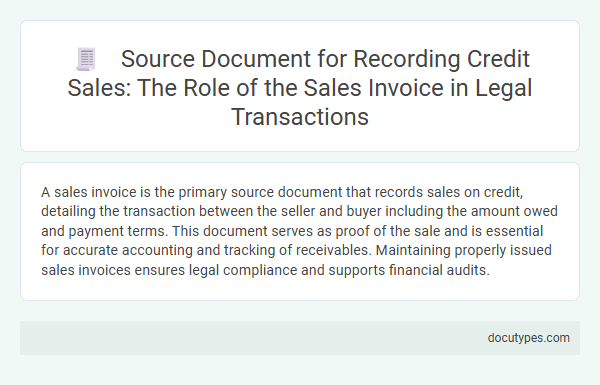A sales invoice is the primary source document that records sales on credit, detailing the transaction between the seller and buyer including the amount owed and payment terms. This document serves as proof of the sale and is essential for accurate accounting and tracking of receivables. Maintaining properly issued sales invoices ensures legal compliance and supports financial audits.
Introduction to Credit Sales and Source Documents
Credit sales occur when goods or services are sold to a customer with payment deferred to a later date. Understanding the source documents that record these transactions is essential for accurate legal and financial record-keeping.
- Sales Invoice - This document serves as the primary record of credit sales, detailing the buyer, items sold, quantity, price, and payment terms.
- Sales Journal - A ledger where all credit sales transactions are systematically recorded, providing a chronological account for reference and audit.
- Customer Account Statement - This document summarizes the credit sales and payments for each customer, helping you track outstanding balances and ensure timely collections.
Definition and Importance of Sales Invoice
A sales invoice is the primary source document that records sales made on credit. It details the transaction, including the buyer's information, items sold, quantities, prices, and payment terms. Your accurate and timely issuance of sales invoices is crucial for maintaining clear financial records and ensuring proper accounts receivable management.
Legal Requirements for Sales Invoices
| Source Document | Sales Invoice |
|---|---|
| Purpose | Records sales made on credit, serving as proof of a transaction and terms agreed between seller and buyer. |
| Legal Requirements for Sales Invoices |
|
| Importance | Sales invoices serve as legally binding documents for credit transactions, essential for accounting, taxation, and dispute resolution. |
Essential Components of a Sales Invoice
What source document records sales on credit? A sales invoice is the primary source document that records sales on credit. It provides detailed information about the transaction, ensuring accurate accounting and customer records.
What are the essential components of a sales invoice? Key elements include the seller and buyer information, invoice date, unique invoice number, description of goods or services, quantity, unit price, total amount, payment terms, and any applicable taxes. These components facilitate transparent communication and legal compliance in credit sales.
Sales Invoice as Evidence in Legal Disputes
The sales invoice serves as the primary source document that records sales on credit, detailing buyer and seller information, products or services sold, credit terms, and payment due dates. In legal disputes, the sales invoice acts as critical evidence to substantiate the existence of a credit sale, verify transaction details, and support claims for payment enforcement. Courts and regulatory authorities recognize the sales invoice as an authoritative record, ensuring transparency and accountability in commercial credit transactions.
Compliance and Record-Keeping Obligations
The source document that records sales on credit is typically the sales invoice. This document provides a detailed account of the transaction, including the buyer's information, items sold, credit terms, and payment due dates.
Maintaining accurate sales invoices is essential for compliance with accounting regulations and tax laws. Your record-keeping obligations require preserving these documents to substantiate revenue and support audits. Proper documentation helps prevent disputes and ensures transparency in financial reporting.
Sales Invoice in Contractual Agreements
The primary source document that records sales on credit is the sales invoice. This document serves as a formal request for payment from the buyer to the seller and details the goods or services provided on credit terms.
In contractual agreements, the sales invoice plays a critical role by outlining payment obligations, due dates, and any agreed-upon credit limits. Your business relies on this document to ensure clear communication and legal enforceability of credit sales transactions.
The Role of Sales Invoice in Auditing and Taxation
Sales invoices serve as the primary source document for recording sales on credit, providing detailed evidence of the transaction between buyer and seller. These documents are crucial in legal auditing and taxation processes, ensuring transparent and accurate financial reporting.
- Legal Evidence - Sales invoices function as legally recognized proof of credit sales agreements between parties.
- Audit Trail - Auditors rely on sales invoices to verify revenue accuracy, detect discrepancies, and validate financial statements.
- Tax Compliance - Tax authorities use sales invoices to assess taxable income and ensure proper VAT or sales tax collection.
Electronic Sales Invoices: Legal Validity
Electronic sales invoices serve as primary source documents that record sales on credit in modern business transactions. They capture detailed information essential for legal compliance and financial auditing.
- Legal Validity - Electronic sales invoices must comply with local tax regulations and e-invoicing standards to be legally recognized.
- Data Integrity - Security measures like digital signatures ensure the authenticity and integrity of electronic sales invoices.
- Audit Trail - Electronic invoices provide a verifiable audit trail that supports credit sales documentation and dispute resolution.
Your use of legally valid electronic sales invoices streamlines credit sales recording while maintaining compliance with regulatory requirements.
What Source Document Records Sales on Credit? Infographic

